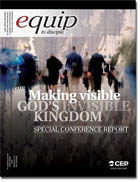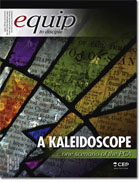 There are certain lessons I have learned over the last decade and a half in youth ministry. I learned early on that taking students to play paintball really means open season on the youth pastor, and I learned that something always gets broken during a lock-in. I figured out that playing dodge ball allows me the opportunity to get back at “that” student, and I realized that the back seat of the church van provides students with way too much privacy. I have observed that youth group couples rarely last and that most parents judge a youth program by whether their child is having a good time at youth group. I found out that playing youth group games in the sanctuary never ends well and that students seldom bring Bibles to church. I also realized that the most effective way to help students connect the dots between faith and life is having a youth group that worships together, prays for each other, and participates in missions experiences.
There are certain lessons I have learned over the last decade and a half in youth ministry. I learned early on that taking students to play paintball really means open season on the youth pastor, and I learned that something always gets broken during a lock-in. I figured out that playing dodge ball allows me the opportunity to get back at “that” student, and I realized that the back seat of the church van provides students with way too much privacy. I have observed that youth group couples rarely last and that most parents judge a youth program by whether their child is having a good time at youth group. I found out that playing youth group games in the sanctuary never ends well and that students seldom bring Bibles to church. I also realized that the most effective way to help students connect the dots between faith and life is having a youth group that worships together, prays for each other, and participates in missions experiences.
taking students to play paintball really means open season on the youth pastor…
At YXL this past summer (CEP’s denominational leadership conference for high school students), the Lord blessed us with great times of worship and prayer. It seemed to the leadership of the conference that the next step would be to take on a mission trip as many of these students who would like to go. Though we attempt each summer to incorporate some type of ministry experience into the conference, like street evangelism or a service project, this would be our first attempt at a full blown mission trip. Because as a conference YXL hopes to help students better understand how to be leaders in both the church and the kingdom, it was important that our mission trip be connected with a local church and allow students to engage with people who are not involved in a church.
On December 27th, students and adults from seven states and one foreign country gathered at Covenant Presbyterian Church in Fayetteville, GA for a day of training, team building, and corporate Sabbath worship before heading to our final destination, Chattanooga, Tennessee. Our host church, New City Fellowship Chattanooga (www.newcityfellowship.com), allowed us to join with their new church plant in the East Lake neighborhood of Chattanooga to lead a Christmas VBS program and do work projects in the community. Hope for the Inner City (www.hope4.org) provided our lodging and Brian McKeon, director of 3RInternational mission agency, served as our coordinator for the trip. During the course of the week, we painted rooms, cleaned church basements, raked leaves, went door to door visiting folks from the neighborhood, picked up kids in the church van and put on a one of a kind YXL Christmas VBS program. But of all the things that happened during the week, it was the times I saw the light bulb switch on in students’ minds about the relevancy of their faith to all of life that made the late nights, early mornings, and sleeping on the floor worth it.
In certain circles it is currently en vogue to question the effectiveness of what has been happening in youth ministry over the last three decades. As a result, many of us are rethinking our youth ministry paradigms and methodologies. However, I left my week in Chattanooga reminded again of the many lessons I have learned in youth ministry. Foremost on my mind was the connection between faith and life for students that happens when they worship together, pray for each other, and participate in missions experiences. Perhaps the answer to all our questions about effective youth ministry can be found by allowing students to do those three things.
For more information about YXL, check out our website – www.pcacep.org/yxl – or the website about our sister conference in Glorieta, New Mexico – www.yxlglorieta.org.


 I have a confession to make. The pressure was on and in the heat of the moment I succumbed to what Jason Stephenson, youth director at Westminster Presbyterian Church in Atlanta, labels the “pragmatism of youth ministry.” In the last issue of Equip to Disciple, I stated that the first question that should be asked about youth ministry is not programmatic, but should concern itself with the theological foundation. Yet when a pastor looking for a youth director called and asked what the distinctives of a Reformed youth ministry were, I forgot my own sage advice. After describing the discipleship programs of several PCA youth ministries, the pastor stopped me and pointed out that nothing I had described was distinct to a Reformed youth program. Without intending to, I had fallen into the trap that so many of us who are engaged in student ministry find ourselves in: looking for a program or event to solve all the problems in our youth ministry. Not that there is anything inherently wrong with programs or events; however, I am more and more convinced the proper foundation on which to build and sustain a youth program is God’s covenant relationship with humanity.
I have a confession to make. The pressure was on and in the heat of the moment I succumbed to what Jason Stephenson, youth director at Westminster Presbyterian Church in Atlanta, labels the “pragmatism of youth ministry.” In the last issue of Equip to Disciple, I stated that the first question that should be asked about youth ministry is not programmatic, but should concern itself with the theological foundation. Yet when a pastor looking for a youth director called and asked what the distinctives of a Reformed youth ministry were, I forgot my own sage advice. After describing the discipleship programs of several PCA youth ministries, the pastor stopped me and pointed out that nothing I had described was distinct to a Reformed youth program. Without intending to, I had fallen into the trap that so many of us who are engaged in student ministry find ourselves in: looking for a program or event to solve all the problems in our youth ministry. Not that there is anything inherently wrong with programs or events; however, I am more and more convinced the proper foundation on which to build and sustain a youth program is God’s covenant relationship with humanity.